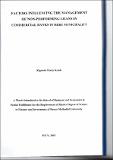| dc.description.abstract | Financial Institutions are very important in any economy as they mobilize savings for productive investments and facilitate capital flows to various sectors of the economy, thus, stimulating investments and increasing productivity. Loans have a vital contribution towards development of any economy. However, its non-payment leads to incidence of huge loss on banks in particular and the country in general. This study investigated the factors influencing the management of non-performing loans in Commercial Banks. The principal motivation behind the study was the absence of empirical studies specifically in Meru Municipality on the management of non¬performing loans and the recognition of the critical role bank loans play in the economy. The specific objectives of the study were to determine the influence of insider lending, loan performance assessment, general economic conditions and credit risk identification on the management of non-performing loans in commercial banks. Four theories were considered relevant to the study; Agency theory, Information asymmetry theory, Moral Hazard Theory and the Stakeholder theory. A descriptive survey research design was adopted. The target population was 100 bank officers; ten credit managers and ninety credit officers. The sample size was determined by census method for credit managers and simple random was used to select fifty credit officers from the ten leading commercial banks ranked according to their value of net asset as available from the Central Bank of Kenya listing. This resulted to a sample size of 60 respondents. A well designed self- administered questionnaire was used to collect the data. Descriptive statistics was used to analyze the data collected while logistic regression was used to link the relationship between independent variables and the dependent variable and to test hypothesis at 5% level of significance. Data collected was analyzed using SPSS and presented in form of tables and graphs. The findings revealed that insider lending, loan performance assessment; general economic conditions and credit risk identification all had a significance influence on the management of non-performing loans. The study recommends that loan officials must carefully grant loans by basing their consideration on loan analysis principles, using their discernment as well as experience to verify debtor credibility; i.e., debt repayment ability, capital management and collateral sufficiency. In addition, Loan officials should strictly and regularly monitor how the loan is used in order to be able to promptly handle arising problems. | en_US |

